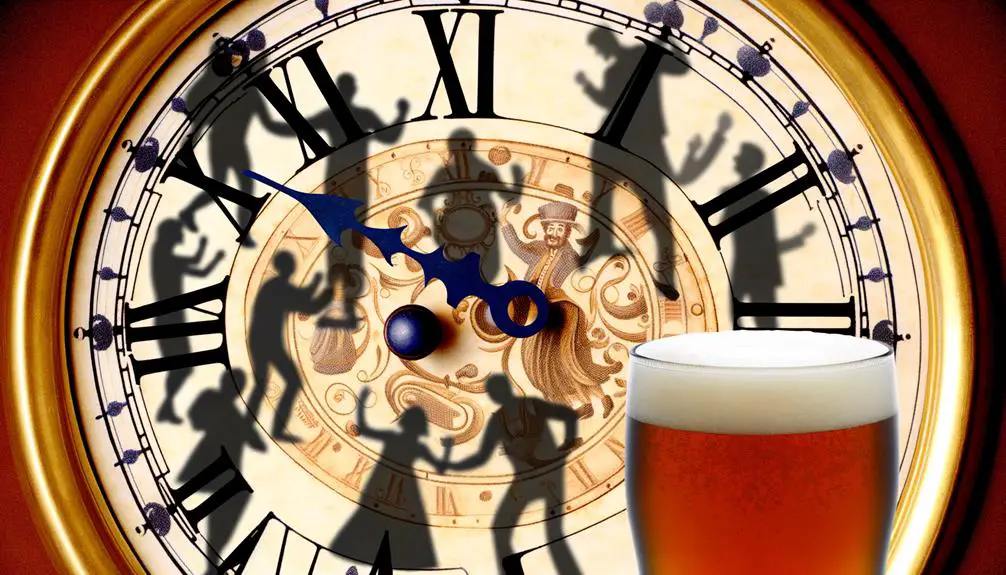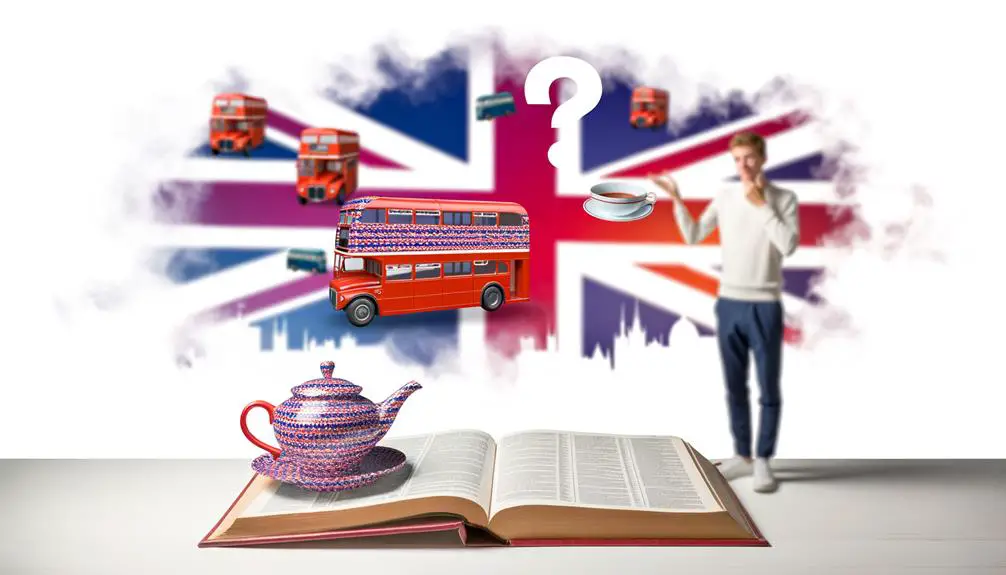In British slang, 'bit' serves as a multifaceted lexicon, capturing the essence of fleeting moments, measuring both quantity and value, reflecting personal and cultural notions of attractiveness, conveying succinct pieces of information, and articulating states of uncertainty. Your exploration reveals its role as a linguistic chameleon, adept at translating life's transient experiences and intricate nuances into concise expressions. This reflects not only linguistic efficiency but also a deep-seated cultural appreciation for moderation, subtlety, and the ephemeral. Further inquiry into this versatile term will expose its profound impact on British linguistic practices and cultural perceptions.
A Moment in Time

How does the term 'bit' encapsulate a specific, often fleeting, moment in the area of British slang, and what nuances does this convey about the perception of time in British culture?
In dissecting the usage of 'bit' within this context, you're delving into a linguistic representation that emphasizes the transient, almost ephemeral nature of certain experiences. The term suggests not just a brief interval, but a qualitative aspect of time that's inherently fleeting—a quick pause in the continuum that might otherwise go unnoticed.
This colloquial usage highlights a cultural appreciation for moments that are brief yet significant; a fleeting second that might hold more weight than its temporal measurement suggests. The term 'bit', in this sense, serves as a linguistic mirror reflecting a societal stance that these quick pauses are of notable importance. It's a recognition that not all valuable experiences or necessary breaks in routine need to be long or drawn out.
Thus, the application of 'bit' in describing time segments within British slang underscores a nuanced understanding of time's value. It's an acknowledgment that worth isn't directly proportional to duration but rather to the impact or quality of the moment experienced.
A Measure of Quantity
While delving into the multifaceted nature of 'bit' in British slang, it is crucial to ponder its role as a measure of quantity, which reveals a complex layer of cultural understanding regarding the balance between scarcity and abundance. This usage intricately ties into everyday life, especially in contexts such as financial transactions and culinary portions, highlighting a uniquely British perspective on value, size, and consumption.
| Context | Usage of 'Bit' | Implication |
|---|---|---|
| Financial | 'A bit more than I expected' | Suggests a slight increase in cost or value, often unexpected |
| Culinary | 'Add a bit of salt' | Indicates precision in adding a small, yet significant, quantity |
| General Conversation | 'I need a bit of time' | Reflects a request for a small, but necessary, amount of time |
In financial transactions, 'bit' subtly conveys a nuanced understanding of value, often hinting at the negotiable nature of price or worth. When applied to culinary portions, it suggests a careful modulation of ingredients, underscoring the importance of balance and flavor. Through this lens, 'bit' becomes a powerful linguistic tool, embodying a philosophy of moderation and appreciation for the 'little things' that enrich the tapestry of British life and language.
Describing Attractiveness

In exploring the multifaceted nature of 'bit' within British slang, its application in describing attractiveness reveals an intriguing layer of linguistic subtlety and cultural nuance. When someone is referred to as 'a bit of all right,' it's not merely a casual comment. It's a declaration steeped in personal preferences and cultural influences, showcasing a unique blend of individual taste and societal norms.
This usage highlights how the concept of attractiveness transcends mere physical appeal, intertwining with personality traits, charisma, and other intangible qualities. It's a demonstration of the complexity of human attraction, where personal preferences are in constant dialogue with cultural influences. The term 'bit' in this context acts as a linguistic mirror, reflecting the subjective nature of beauty and the diverse criteria that underpin it.
Moreover, this slang usage underscores the dynamic nature of language in encoding and expressing social constructs. It's a vivid example of how colloquialisms can encapsulate complex ideas about human desirability, offering insights into the evolving landscape of what it means to be attractive within a particular cultural milieu. Through this lens, 'bit' serves not only as a descriptor but as a window into the interplay between language, perception, and societal values.
A Piece of Information
Venturing beyond its colloquial usage in describing attractiveness, the term 'bit' also plays a pivotal role in British slang as a succinct reference to a piece of information. This usage intriguingly intersects with digital terminology, where 'bit' represents the smallest unit of data in computing, underscoring the term's versatility and adaptability across different contexts.
In analyzing this application, one can discern several facets that highlight the cultural nuances and the term's embeddedness in the linguistic fabric:
- Economy of Language: Utilizing 'bit' to denote information reflects a linguistic efficiency prevalent in British slang. It's a reflection of how language evolves to accommodate the need for brevity and precision in everyday communication.
- Cultural Embeddedness: The seamless integration of 'bit' into conversational vernacular illustrates its resonance with British cultural idiosyncrasies. It's a linguistic marker that distinguishes British English, imbuing it with a unique character and flair.
- Digital Resonance: The dual significance of 'bit'—both in digital terminology and as slang for information—mirrors the contemporary landscape where digital culture profoundly influences linguistic expressions. This convergence signifies a fascinating interplay between technology and language evolution.
In essence, 'bit' as a piece of information encapsulates the dynamic interplay between linguistic economy, cultural specificity, and digital influence, offering a rich tapestry of meanings that transcend its simplistic appearance.
Expressing Uncertainty

How does the term 'bit' evolve to capture the essence of expressing uncertainty within the rich tapestry of British slang? Initially, 'bit' simply denotes a small portion or fragment, but in the domain of colloquial British English, it's been ingeniously repurposed to convey a sense of questionable doubt or an unsure feeling. When you say you're 'a bit unsure' or 'a bit doubtful,' you're leveraging this linguistic flexibility to express a nuanced state of uncertainty.
This evolution reflects the dynamic nature of language, where words stretch and adapt to encapsulate new meanings. In scholarly analysis, this transformation is significant. It illustrates how linguistic elements morph over time, influenced by cultural shifts and social interactions. The term 'bit,' in this perspective, becomes a linguistic marker of uncertainty, subtly conveying that the speaker isn't wholly convinced or lacks full confidence in their assertion.
Moreover, this usage underscores the British cultural penchant for understatement. To say something is 'a bit' questionable or to feel 'a bit' unsure is to temper the expression of doubt, softening the blow of uncertainty. This linguistic strategy enriches communication, allowing for the expression of nuanced emotional states and thoughts that might otherwise go unarticulated.
Frequently Asked Questions
How Does the Use of "Bit" in British Slang Vary Across Different Regions of the Uk?
In the UK, the slang use of "bit" varies widely due to regional accents and local idioms, reflecting cultural nuances. You'll find its meaning shifts, offering a rich tapestry of linguistic diversity across regions.
Can the Slang Term "Bit" Be Considered Offensive or Derogatory in Certain Contexts Within British Culture?
Yes, the term 'bit' can be considered offensive in certain British contexts, where bit etiquette and cultural perceptions play an important role. It's important to analyze the implications carefully to avoid misunderstandings or disrespect.
How Has the Meaning and Usage of "Bit" in British Slang Evolved Over the Last Century?
You'll find 'bit's etymology in British slang has shifted remarkably over the last century, particularly in advertising. Initially nuanced, its usage today spans various contexts, reflecting societal changes and influences in communication styles.
Are There Any Notable Films, Songs, or Books That Have Significantly Popularized the Use of "Bit" in British Slang?
You're exploring how various media have spotlighted 'bit's etymology and its versatility. While there aren't specific titles solely responsible, its frequent use across genres highlights its integration into the vernacular, reflecting cultural shifts and linguistic adaptability.
How Does the British Slang Term "Bit" Compare or Contrast With Similar Slang Terms in American or Australian English?
You're exploring 'bit's origin story and comparative slang nuances. It diverges from American or Australian slang in subtlety and usage. Analyzing these variations reveals cultural insights and linguistic adaptations unique to each English-speaking region.
Conclusion
As you've now explored, the term 'bit' in British slang astonishingly serves multiple purposes, coincidentally aligning with the rich tapestry of English linguistic evolution. You've seen it signify a fleeting moment, quantify amounts, rate attractiveness, convey snippets of knowledge, and articulate doubts with remarkable versatility.
This linguistic dexterity, underscored by detailed analysis, not only highlights the word's adaptability but also mirrors the dynamic nature of language itself, adapting to fit the contours of culture and communication.







